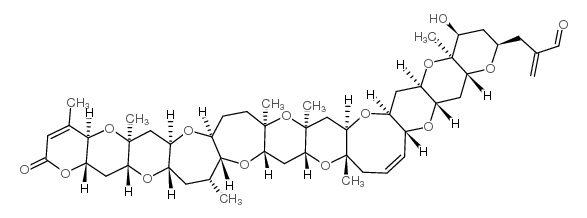85079-48-7
| Name | Brevetoxin 3 |
|---|---|
| Synonyms |
GB 3 toxin
T-17 toxin Brevetoxin PbTx 3 PbTx 3 GB 3 [3H]-PbTx 3 Brevetoxin T17 brevetoxin-3 Toxin T-17 Ptychodiscus brevis toxin 3 |
| Description | Brevetoxin-3 (PbTx-3) is a potent allosteric voltage-gated Na+ channel activator and has multiple active centers (A-ring lactone, C-42 of R side chain)[1]. Brevetoxin-3 (PbTx-3) has a high affinity to site 5 of the voltage-sensitive Na+ channels, inhibits the inactivation of Na+ channels and prolongs the mean open time of these channels. Brevetoxin-3 (PbTx-3) repeated exposures can lead to prolonged airway hyperresponsiveness (AHR) and lung inflammation[2]. |
|---|---|
| Related Catalog | |
| Target |
IC50: voltage-gated Na+ channel[1] |
| In Vitro | Brevetoxin-3 (PbTx-3)(30-500 nM) produces a shift in activation to more negative membrane potentials whereby single-channel activity is observed under steady-state conditions (maintained depolarization at -50 mV)[1]. |
| In Vivo | Brevetoxin-3 (PbTx-3)(intratracheal instillation; 2.8 μg/kg; gestational days 15-18) radioactivity is detected in placentas and fetuses within 0.5 hours. Concentrations of brevetoxin equivalents in fetuses are approximately 0.3 ng/g throughout the 48-h post-dosing, resulting in a calculated dose to fetuses of 19 ng/gh. Following brevetoxin infusion, concentration of brevetoxin equivalents in fetuses is 0.1 ng/g, lower than that present in most maternal tissues[3]. . Animal Model: Pregnant CD-1 mice[3] Dosage: 2.8 μg/kg Administration: Intratracheal instillation; 2.8 μg/kg; gestational days 15–18 Result: Demonstrated placental transport of brevetoxin or its metabolites following maternal acute exposure. |
| References |
| Density | 1.187g/cm3 |
|---|---|
| Molecular Formula | C50H72O14 |
| Molecular Weight | 897.09800 |
| Exact Mass | 896.49200 |
| PSA | 159.06000 |
| LogP | 5.26550 |
| Index of Refraction | 1.52 |
CHEMICAL IDENTIFICATION
HEALTH HAZARD DATAACUTE TOXICITY DATA
|
| RIDADR | UN 3172 |
|---|---|
| Hazard Class | 6.1(a) |
| Precursor 0 | |
|---|---|
| DownStream 1 | |

